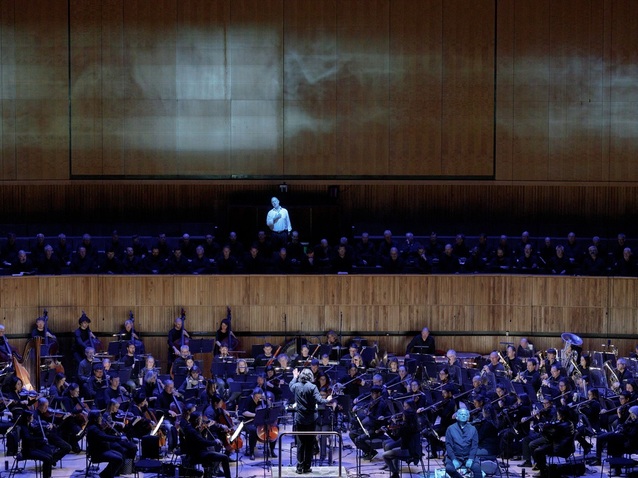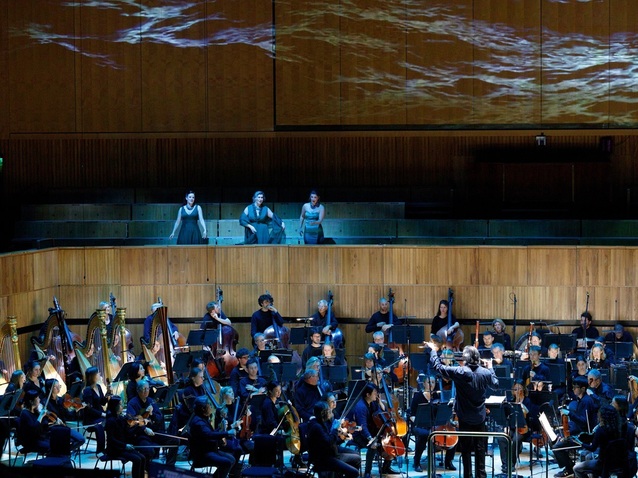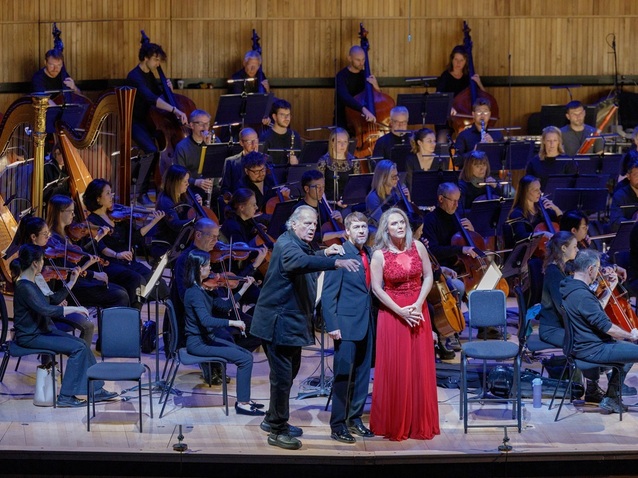 © London Philharmonic Orchestra
© London Philharmonic Orchestra
Götterdämmerung is the fourth and final opera in Richard Wagner’s tetralogy Der Ring des Nibelungen, and premiered at the Bayreuth Festspielhaus on 17 August 1876 as part of the first performance of the entire work. The first three operas tell the story of the overthrow of the old world order of the gods, who rule through order, contract and treaty, by the mortals whose power derives from morality, reason and, above all, love. The moment that encapsulates the ‘changing of the guard’ comes in the third opera Siegfried when the eponymous hero breaks the spear of the chief god Wotan, thus destroying his power and rendering defunct all of the agreements that have been notched upon it.
Following his defeat Wotan has returned to his fortress Valhalla to await ‘the end’, and Götterdämmerung sees it materialise. Siegfried, who by now has found his true love Brünnhilde, journeys down the Rhine in search of adventure only to encounter the manipulative Gibichungs comprising Gunther, his sister Gutrune and half-brother Hagen. The latter shares a mother with Gunther, but his father is the Nibelung Alberich who stole the gold from the Rhinemaidens to forge it into a powerful ring that makes the bearer all powerful. It was subsequently stolen from him and eventually ended up in Siegfried’s possession. Alberich had Hagen with the sole aim of retrieving the ring, with the consequence that he is single-minded in his quest and entirely lacking in love. After Hagen kills Siegfried under the pretext of having sworn a false oath, he claims the ring for himself, but Brünnhilde, who as Siegfried’s wife is now its rightful owner, returns it to the Rhinemaidens. Then by riding her horse into Siegfried’s funeral pyre, and uniting herself with him in death, she sets off a chain reaction of events that ultimately see Valhalla destroyed by fire. The opera ends with the Rhine bursting its banks, thus extinguishing the flames that have also set the Hall of Gibichung alight, and in the process cleansing and redeeming the world.
It is not unknown for opera houses to commence a Ring Cycle, and never complete it as a result of financial pressures, but the London Philharmonic Orchestra may be a contender for the honour of presenting Der Ring des Nibelungen over the longest period of time. The first opera Das Rheingold appeared in 2018, Die Walküre in 2019 and Siegfried in February 2020. The original plan was then to perform all four operas across two complete Cycles in January and February 2021 to coincide with the end of Vladimir Jurowski’s tenure as Principal Conductor of the LPO. Then COVID-19 disrupted the enterprise, leading to the conclusion that it was unfeasible to reschedule an entire Cycle but that it was possible to conclude the one that had already begun by presenting the final opera Götterdämmerung. Even staging that, however, was not without its obstacles because it had to be sufficiently after the crisis for there to be no risk of further disruptions, and at a time when all of the people required for the venture were available.

Robert Hayward, Vladimir Jurowski and the London Philharmonic Orchestra
If it was a long wait, it was one that was definitely worth it as the output of the LPO was quite exceptional. Jurowski captured the overall sweep of the music, while showing an exquisite attention to detail and delineating a vast array of nuances. The Rhine Journey was consequently exhilarating because the perfect pace and balance that was achieved across the forces proved to be the foundation upon which a sense of joyous wonder could be established. Certain sections really shone, and the brass was impressive all evening. Its tone could be quite forthright, but when this combined with such high levels of precision and clarity the results were positively spellbinding. The playing of the offstage horns and steerhorns was particularly notable, while the trombones appeared in the choir stalls with the chorus for the start of Hagen’s Call.
Given the difficulties, even with modern technology, in a staging ever fulfilling Wagner’s literal vision for Götterdämmerung, and the fact that any ‘alternative’ interpretation will never please everyone, it is sometimes said that the perfect production of Götterdämmerung exists only in the mind. If so, then this semi-staged performance could be seen as succeeding where full ones invariably fail. However, it offered even more than that because director PJ Harris’s conception enabled enough to be left to the imagination while allowing for a focus on thoughtful characterisation. There was a considerable amount of interaction between the principals, but as a rule they faced directly to the front when actually singing. For example, during ‘Zu neuen Thaten, theurer Helde’ and ‘O! heilige Götter!’ Brünnhilde and Siegfried did embrace or gaze into each other’s eyes, but generally at the start and end of ‘sections’. This was necessary to aid projection, but it also acknowledged that it is a mistake to try to do too much in a semi-staged performance. Most importantly, when characters gaze outwards it can allow the audience to enter their minds to a greater degree so that in Act II’s Vengeance Trio the feelings, dilemmas and calculations of Brünnhilde, Hagen and Gunther could be conveyed more clearly than in many full productions. The moment when Siegfried and Gunther became blood brothers was also cleverly executed by not actually showing the characters slash their wrists, but still revealing how Hagen was engineering everything by having him place their arms in the right place for the oath.

Alina Adamski, Alexandra Lowe, Angharad Lyddon, Vladimir Jurowski and the London Philharmonic Orchestra
There were a few projections, courtesy of Pierre Martin Oriol, that provided act and scene headings as well as images of mist, fire, water and ravens to tie in with the drama’s various locations. They worked well because they were not too obtrusive, and the same could be for said for Mark Jonathan’s lighting designs, which on occasions cast patterns or green hues across the performance space. Das Rheingold in 2018 saw all of the singers perform from the choir stalls behind the LPO, which put the action further away than was necessary, and required the soloists to project over a far larger area than if they had stood in front of the orchestra. Here, these stalls were used to better effect so that only some characters such as the Norns (an excellent Claudia Huckle, Claire Barnett-Jones and Evelina Dobračeva) sang from them. It worked particularly well when Alberich in the stalls appeared to Hagen on the main stage as placing the two characters in different ‘realms’ suggested how the former was visiting the latter in his sleep. Less successful was similarly putting the Rhinemaidens up high. The trio (Alina Adamski, Alexandra Lowe and Angharad Lyddon) revealed extremely accomplished voices, but efforts to sweet talk and flatter Siegfried did not have the same impact when he was so physically removed from them. The chorus, comprising the London Philharmonic Choir and London Voices, obviously appeared in the choir stalls and, as well as sounding very good, provided strong reactions to everything that they observed.
Burkhard Fritz was a persuasive Siegfried who asserted his warm and strong tenor to excellent effect, and revealed a convincing range of reactions for one who is manipulated so much during the opera. When Gunther freely granted him all of his possessions, he looked confused, partly out of worry that he could offer nothing in return, but mainly because the desire for such wealth was simply not in his mindset. As Brünnhilde, Svetlana Sozdateleva revealed an immensely rich soprano that, perhaps by the same token, was not always as strong at capturing the Valkyrie’s more soaring lines. Nevertheless, she grew in stature over the evening so that by Act II she had really warmed to the task.

Albert Dohmen, Günter Papendell, Sinéad Campbell Wallace, Vladimir Jurowski and the London Philharmonic Orchestra
Albert Dohmen was a first rate Hagen, combining a tremendous bass-baritone with a very interesting persona. Although he was as calculating as any Hagen, Dohmen revealed the torment he felt to the full and, particularly in his encounter with Alberich, his resentment at leading a loveless life. Normally, during Hagen’s Call the figure appears completely triumphant as he sees his plans working out, and relishes the power that giving orders hands him (obtaining power is, after all, his sole aim). Here, even at such a moment, it felt as if Hagen was trapped in a tortuous existence so that when the chorus bombarded him with numerous questions he appeared genuinely hassled.
Günter Papendell was an extremely effective Gunther, revealing a very secure baritone and the right sense of weakness in the character, while, as Gutrune, Sinéad Campbell Wallace combined a glistening soprano with appropriate levels of seductiveness and neediness. It was a nice touch, however, for the pair to embrace when she ultimately accepted that Brünnhilde had been more wronged than her. Kai Rüütel-Pajula, with her stirring mezzo-soprano, gave a highly engaging performance as Brünnhilde’s sister Waltraute, while Robert Hayward, with his firm bass-baritone, helped us to appreciate how, in the face of all the arguments for returning the ring to the Rhinemaidens, this was the worst action imaginable for Alberich.
The performance was dedicated to the memory of Sir Andrew Davis who sadly died on 20 April, and whose long association with the LPO was cemented by his period as Music Director of Glyndebourne from 1989 to 2000.
By Sam Smith
Götterdämmerung | 27 April 2024 | Royal Festival Hall, Southbank Centre
the 30 of April, 2024 | Print
Comments